#devOps trends
Explore tagged Tumblr posts
Text
Infrastructure as Code (IaC) in DevOps: The Key to Streamlined DevOps Infrastructure Management
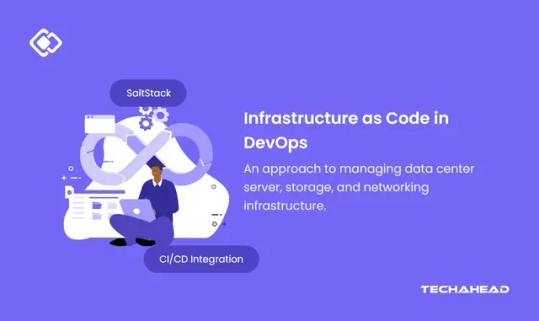
DevOps has undoubtedly been one of the most transformative trends in the development industry in recent years. Currently, there are thousands of DevOps job openings listed in the US. 74% of companies, including giants like Amazon, Facebook, Netflix, Walmart, and NASA, have already embraced DevOps practices.
The global Infrastructure as Code (IaC) market was valued at $0.8 billion in 2022 and is expected to surge to $2.3 billion by 2027, experiencing a compound annual growth rate (CAGR) of 24% during this period.
A core principle of DevOps is maximizing automation, which naturally extends to infrastructure management. Embracing Infrastructure as Code in DevOps is essential to fully align with the DevOps methodology.
Infrastructure as Code (IaC) is a software engineering practice that enables the management and provisioning of infrastructure resources through code. This involves writing code to define and configure components like virtual machines, networks, storage, and other resources required for systems or applications.
With IaC, teams no longer manually set up infrastructure through graphical interfaces or command-line inputs. Instead, they write configurations in code, using declarative languages or configuration files. They can version, review, and test this code like any other software.
This approach marks a major shift in IT infrastructure management. Traditionally, configuring servers, networks, and storage was time-intensive and prone to errors. However, Infrastructure as Code in DevOps has streamlined this process, reducing manual effort and enhancing consistency.
Let’s delve deeper into understanding IaC and its benefits to streamline DevOps infrastructure management.
Key Takeaways:
Infrastructure as Code enables the management of IT infrastructure through code, enhancing automation and consistency
IaC eliminates manual configuration, reducing errors and enabling faster environment provisioning
Integrating IaC into CI/CD pipelines ensures infrastructure evolves alongside application code for faster, more reliable deployments
IaC boosts reliability, scalability, disaster recovery, and cost efficiency, making it indispensable for modern DevOps practices
What is Infrastructure as Code?
Infrastructure as Code (IaC) refers to the practice of managing and provisioning IT infrastructure through code. Traditionally, configuring servers, storage, or networks was manual, time-consuming, and prone to errors. With the Infrastructure as Code approach, teams automate these processes, reducing risks and boosting efficiency.
IaC allows developers and IT teams to write code that manages infrastructure just as they would manage software. This means teams version-control, test, and continuously improve the infrastructure just like any application. They create stable environments that are easy to deploy, ensuring consistency and repeatability.
How Does Infrastructure as Code Work in DevOps?
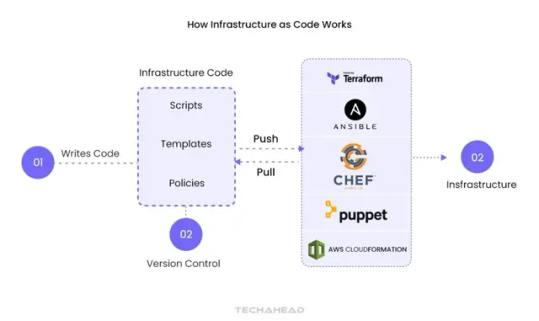
In a DevOps or DevSecOps environment, the Infrastructure as Code approach is key to automating and managing infrastructure with precision. By treating infrastructure as code, organizations can achieve higher efficiency, scalability, and security across their IT operations. Let’s dive deeper into each of the stages:
Infrastructure Definition
Here, teams write all components of the infrastructure, such as virtual machines, databases, and network settings, as code. Instead of manual configuration, teams use high-level languages like YAML, JSON, or HCL to describe these elements. This allows developers to define the exact infrastructure requirements consistently. A well-defined infrastructure through code means that environments can be replicated across development, testing, and production without discrepancies, ensuring consistency and reducing the likelihood of errors.
Versioning
One of the biggest advantages of the Infrastructure as Code is the ability to version control the infrastructure. Using platforms like Git, teams can store their infrastructure code in repositories. This brings traceability, as every change is tracked, and you can see who made it, when, and why. Versioning also empowers teams to roll back to previous configurations if something goes wrong during updates or deployments. This ensures stability and gives teams the confidence to make frequent changes without fear of breaking infrastructure.
Automated Provisioning
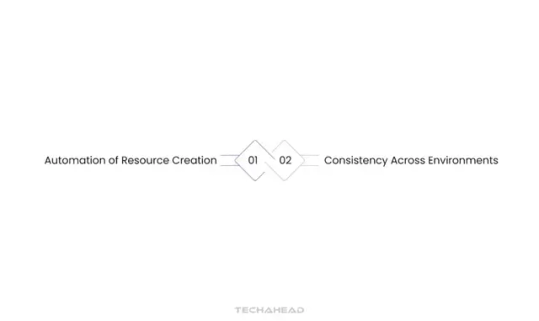
When it comes to provisioning infrastructure, tools like Terraform, AWS CloudFormation, or Ansible play a crucial role. They read the code that defines the infrastructure and automatically create the necessary resources. Whether it’s launching servers, setting up databases, or configuring entire networks, these tools automate every step. This eliminates manual setup, reducing human errors and speeding up deployment times. Automated provisioning also ensures that the infrastructure is consistently deployed across different environments, maintaining reliability.
CI/CD Integration
In modern DevOps practices, infrastructure must keep up with the fast pace of software releases. With Infrastructure as Code, integration with Continuous Integration/Continuous Deployment (CI/CD) pipelines is seamless. As developers push updates to the application code, the corresponding infrastructure changes can also be tested and deployed automatically. This means that infrastructure evolves alongside the application, staying up-to-date and scalable. The automation in CI/CD pipelines ensures faster, more reliable deployments, enabling businesses to rapidly adapt to changes or scale their infrastructure as needed.
By leveraging Infrastructure as Code, organizations can not only automate infrastructure provisioning but also create resilient, scalable, and secure environments that evolve effortlessly with their applications.
Benefits of IaC in DevOps
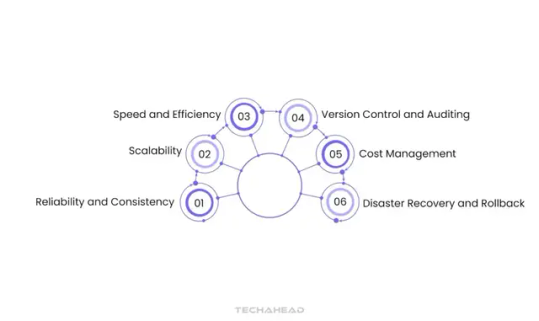
The Infrastructure as Code (IaC) model offers transformative benefits in the DevOps lifecycle. Let’s explore these advantages further in detail:
Reliability and Consistency
One of the primary challenges in traditional IT environments is inconsistent configurations across various environments, such as development, testing, and production. With IaC, infrastructure is written as code, ensuring that the same configuration is applied consistently. This eliminates environment-specific bugs and ensures uniform behavior across all stages. It addresses the “it works on my machine” issue, where an application behaves correctly in development but fails in other environments. By standardizing configurations, IaC reduces errors and enhances system stability over time.
Scalability
IaC makes scaling infrastructure remarkably simple. In a traditional setup, scaling meant manually adding resources like servers, storage, or network configurations—a process that could take hours or days. With IaC, this is achieved by updating the code. Whether scaling up for increased workloads or scaling down during periods of lower demand, these changes can be made instantly. Tools like Terraform or AWS CloudFormation ensure that the infrastructure dynamically adapts based on changes in the code, allowing businesses to scale rapidly without delays or errors.
Speed and Efficiency
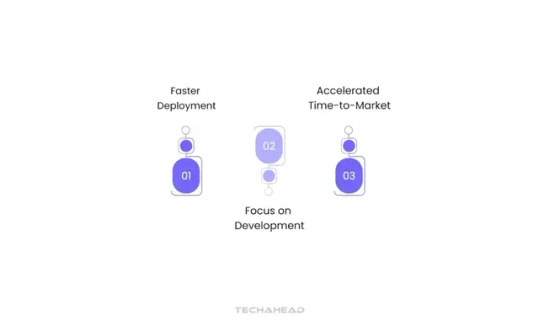
IaC accelerates the deployment process. Traditionally, setting up infrastructure involved multiple manual tasks—configuring servers, installing software, and managing network settings—all of which could take significant time. IaC automates these steps, enabling the infrastructure to be provisioned in minutes, not days. This allows development teams to focus on building and deploying applications rather than managing infrastructure. The increased speed and reduced overheads lead to more rapid development cycles and faster time-to-market.
Version Control and Auditing
Every infrastructure change is recorded in version control systems (VCS) like Git. This means that every modification—whether it’s adding a server or tweaking a network configuration—is documented and traceable. Teams can see exactly who made what change and when. This level of transparency helps in auditing and troubleshooting. Additionally, in the event of a problem, teams can revert to a previous version of the infrastructure with ease, minimizing risks during updates or deployments.
Disaster Recovery and Rollback
In the event of a failure, the recovery process is vastly simplified with IaC. If an infrastructure change leads to unexpected issues, teams can easily roll back to the last known stable version of the infrastructure code stored in the version control system. This rollback capability is crucial for minimizing downtime and preventing prolonged disruptions. IaC ensures faster recovery and improves resilience, making it a powerful tool in disaster recovery planning.
Cost Management
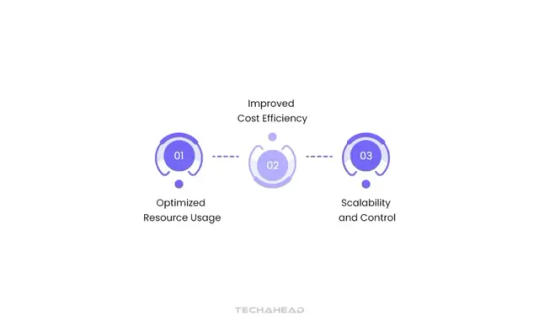
Effective resource management is critical for cost control, especially in cloud computing. IaC allows organizations to create temporary environments for specific tasks, such as testing new features. Once testing is completed, these environments can be automatically de-provisioned to avoid incurring unnecessary costs. This level of flexibility ensures that resources are only utilized when necessary, optimizing cloud spending and preventing resource wastage. The ability to automate provisioning and decommissioning through code significantly enhances cost efficiency.
Overall, the Infrastructure as Code approach drives consistency, efficiency, and scalability across IT operations, making it indispensable for modern DevOps practices. It empowers teams to innovate faster while maintaining robust control over infrastructure, ensuring that businesses can scale seamlessly and respond quickly to changing demands.
Common Tools for Infrastructure as Code
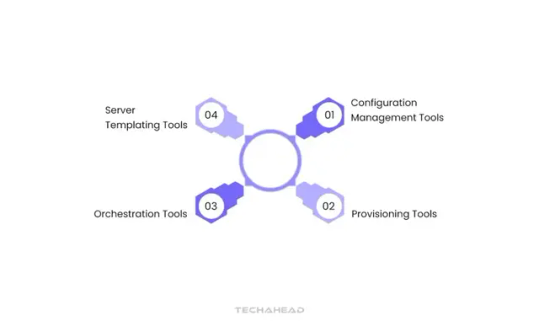
DevOps team rely on four main types of Infrastructure as Code in DevOps tools to streamline operations. Each tool serves a distinct purpose in automating and managing infrastructure.
Configuration Management Tools
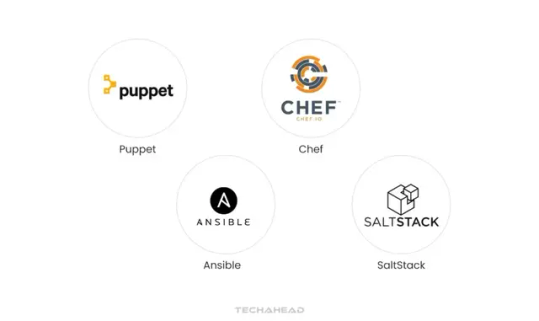
Configuration management tools focus on automating software installation and managing configurations on existing servers. By ensuring uniform setups across all servers, they eliminate manual errors and configuration drifts.
Puppet
Puppet shares many similarities with Chef, standing out among Infrastructure as Code in DevOps tools. It’s integral to countless CI/CD pipelines that DevOps engineers rely on. Puppet uses a Domain Specific Language (DSL) based on Ruby, allowing you to declare the desired state of your infrastructure and its functionalities. It then automatically determines the most efficient path to achieve the specified configuration.
If there are any deviations from this desired state, Puppet actively monitors and corrects these changes, restoring the infrastructure to its intended setup. This powerful open-source solution supports major cloud platforms like Google Cloud Platform (GCP), Microsoft Azure, and Amazon Web Services (AWS), enabling seamless automation across diverse environments.
Key Features:
Puppet employs a Ruby DSL for defining system configurations, making scripting more intuitive and powerful.
It offers an extensive module library through Puppet Forge, enhancing functionality and customization.
Puppet’s idempotent nature ensures that applying a configuration repeatedly yields consistent results, boosting stability.
Chef
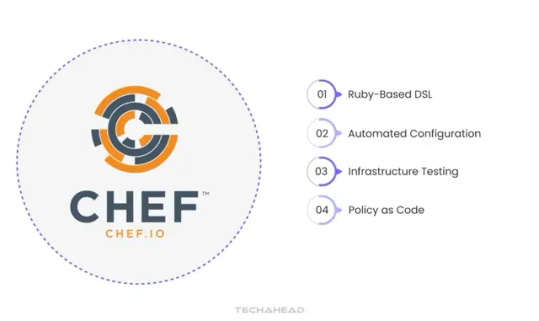
Chef is a powerful automation platform that converts Infrastructure as Code in DevOps into reality. It enables the automation of building, deploying, and managing IT infrastructure, providing organizations with precise control over configurations. This control drives greater agility and operational efficiency in IT processes, empowering teams to innovate rapidly.
Key Features:
Chef utilizes a Ruby-based DSL to script system configurations, streamlining the automation process.
It automated server configuration and deployment, reducing manual intervention and potential errors.
Chef supports infrastructure testing with tools like ChefSpec and InSpec, ensuring reliable code quality.
Policy as Code: It allows teams to define policies and configurations as code, enhancing transparency and consistency across deployments,
Ansible
Ansible serves as a versatile IT automation engine, ideal for application deployment, configuration management, and orchestration tasks. Although not a traditional Infrastructure as Code in DevOps tool, ANsible’s adaptability allows it to provision IaC resources using various collections. This capability bridges the gap between IT automation and IaC, offering a unified approach to managing both software and infrastructure with a single toolset.
Key Features:
Ansible operates without requiring agents on target nodes, simplifying the automation process.
YAML-based automation: It leverages YAML to define tasks, making configurations straightforward and readable.
Modular design: Ansible’s modular structure supports reusable modules, enhancing flexibility for diverse automation scenarios.
SaltStack
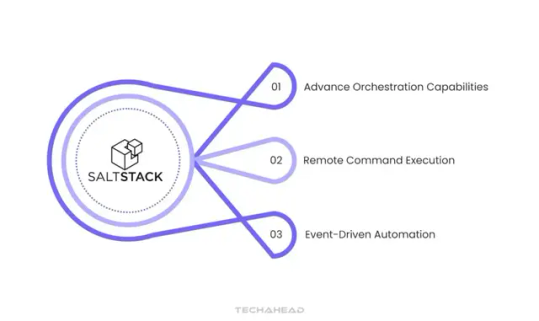
SaltSTack, commonly referred to as Salt, is a robust Python-based tool specializing in Infrastructure as Code in DevOps. It’s designed for efficient configuration management and remote command execution, excelling in both Cloud engineering and on-premises environments.
Key Features:
Advance Orchestration Capabilities: SaltStack supports intricate orchestration and configuration management across diverse environments, ensuring seamless infrastructure automation.
Remote Command Execution: It allows direct command execution on remote systems, streamlining control over distributed infrastructure.
Event-Driven Automation: SaltStack reacts to various system events, triggering automated responses to ensure dynamic and responsive infrastructure management.
Server Templating Tools
Server templating tools allow teams to create reusable templates that define a server’s configuration. These templates act as blueprints, standardizing how new servers are built and ensuring they meet predefined specifications.
Vagrant
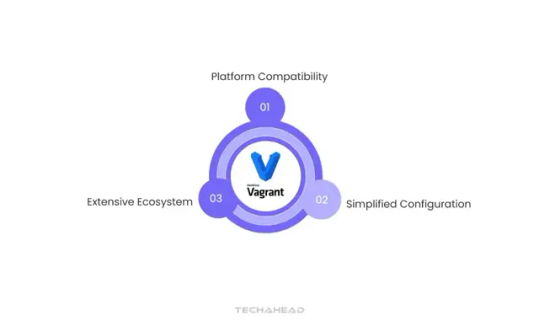
Vagrant streamlines the creation and management of virtual machines, enhancing Infrastructure as Code in DevOps practices by ensuring consistent environments. It allows DevOps engineers to easily share VM setups, promoting seamless collaboration and reducing environment-related issues.
Key Features:
Platform Compatibility: Integrates with VirtualBox, VMware, Docker, AWS, and other major platforms for versatile virtual machine deployment.
Simplified Configuration: Uses a straightforward Vagrantfile to define and configure environments, making setup intuitive and user-friendly.
Extensive Ecosystem: Offers a variety of preconfigured boxes for different operating systems, accelerating deployment with ready-to-use templates.
Orchestration Tools
Orchestration tools manage the coordination between different infrastructure components, ensuring seamless interactions in complex environments. They help
Automate workflows
Enabling multiple services to communicate
Work together efficiently
Kubernetes
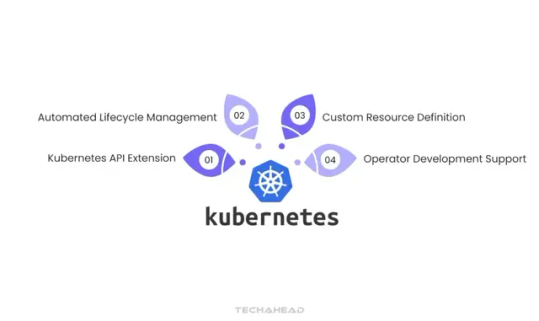
Kubernetes act as specialized controllers that expand the Kubernetes API to handle complex stateful applications, advancing Infrastructure as Code in DevOps. Major cloud platforms like AWS, Microsoft Azure, Google Cloud, and Oracle Cloud Infrastructure offer tailored K8s operators to efficiently provision infrastructure resources.
Key Features:
Kubernetes API Extension: Enhances the Kubernetes API to manage specific application needs, improving operational flexibility.
Automated Lifecycle Management: Simplifies the management of complex stateful applications, ensuring seamless operation within Kubernetes clusters.
Custom Resource Definition: Empowers teams to create and manage custom resources in Kubernetes, boosting control over infrastructure setups.
Operator Development Support: Facilities building new operators, promoting innovation in infrastructure automation.
Provisioning Tools
Provisioning tools focus on the initial creation and configuration of infrastructure components like servers, networks, and storage. They automate the setup process, ensuring a faster and more reliable infrastructure deployment.
Terraform
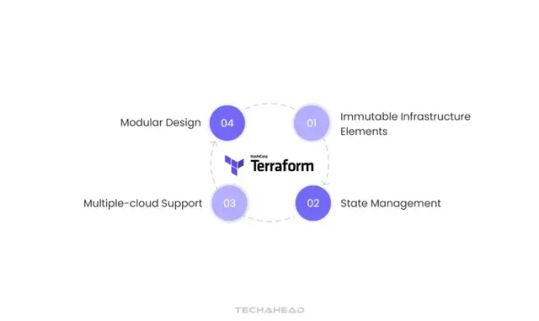
Terraform stands as a leading tool in Infrastructure as Code in DevOps, enabling seamless infrastructure management across multiple cloud platforms using a straightforward declarative language.
Key Features:
Immutable Infrastructure Elements: Ensures consistent configurations, reducing the risk of drift in infrastructure settings.
State Management: Tracks infrastructure state to maintain stability and manage resource dependencies efficiently.
Multiple-cloud Support: Offers compatibility with various cloud providers, enabling diverse infrastructure management.
Modular Design: Promotes reusability and efficiency by allowing the creation of modular code components.
AWS CloudFormation
AWS CloudFormation offers a unified approach to defining and provisioning infrastructure within AWS cloud services, leveraging Infrastructure as Code in DevOps to streamline cloud resource management. This service, tailored exclusively for AWS, ensures a smooth and automated deployment experience, keeping pace with AWS’s latest features and services.
Key Features:
AWS Integration: Seamlessly aligns with AWS services, delivering optimizing support for a wide range of resources.
Declarative Templates: Utilizes JSON or YAML formats to simplify infrastructure definitions.
Change Management: Offers preview capabilities to assess and manage changes before applying them to your infrastructure.
Stack Organization: Groups resources into manageable stacks, enhancing clarity and ease of resource handling.
Comprehensive Resource Support: Extensively support AWS resources, ensuring compatibility with the latest offerings.
These tools play a critical role in Infrastructure as Code in DevOps, enhancing automation, efficiency, and consistency in managing IT infrastructure. They empower teams to build, deploy, and scale environments effortlessly, driving innovation and accelerating development cycles.
Best Practices for Implementation of IaC in DevOps
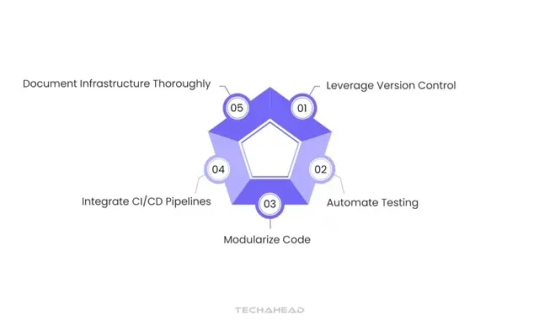
Let’s delve deeper into the best practices for implementing Infrastructure as Code in DevOps, enhancing each point to maximize its effectiveness in a DevOps environment:
Leverage Version Control
Integrating IaC configurations into version control systems like Git is crucial. This practice not only prevents rework by storing every infrastructure update but also provides a clear audit trail of changes. It allows multiple team members to collaborate seamlessly, managing access, tracking revisions, and rolling back to a previous state if needed. Version control acts as both a safeguard and a robust change management system
Automate Testing
Automated testing is vital to maintaining the integrity of your infrastructure setup. Use tools like Terratest to test Terraform modules or AWS Config to check resource compliance against best practices. Automated tests catch issues early, preventing faulty configurations from disrupting deployments. By validating infrastructure before it’s deployed, you ensure that changes won’t lead to instability or errors in production environments.
Modularize Code
Modularization means breaking IaC code into distinct, reusable components. Instead of having a monolithic script, create small, independent modules that focus on specific tasks. This modular approach simplifies updates since you only need to modify individual parts without affecting the entire codebase. It also promotes code reusability, making it easier to scale your infrastructure by reusing proven modules.
Integrate CI/CD Pipelines
Integrating IaC into your CI/CD pipeline is essential for the continuous delivery of infrastructure changes. By embedding testing, validation, and deployment of IaC into the CI/CD process, you ensure that the infrastructure code is automatically validated before deployment. This integration keeps infrastructure and application code in sync, reducing discrepancies and accelerating delivery cycles.
Document Infrastructure Thoroughly
Comprehensive documentation is the backbone of effective Infrastructure as Code in DevOps. Detailing configurations, architectural decisions, and setup procedures aids in knowledge sharing across the team. Proper documentation simplifies troubleshooting and onboarding, helping new team members understand the infrastructure’s architecture and its dependencies quickly.
Implementing these best practices fortifies Infrastructure as Code in DevOps by enhancing collaboration, minimizing risks, and ensuring scalable and consistent deployments. This structured approach to managing IT infrastructure accelerates development cycles and drives innovation in dynamic cloud environments.
Conclusion
Infrastructure as Code (IaC) has significantly reshaped the way DevOps operates. It empowers teams to manage IT infrastructure with the same speed and precision as software development—using automation for consistent results. This approach enables organizations to streamline processes, creating scalable and efficient workflows while managing their infrastructure with ease. This strategy is particularly crucial for Infrastructure as Code in DevOps, especially in web application development, where rapid delivery and infrastructure reliability are non-negotiable.
In this DevOps landscape, employing Infrastructure as Code in DevOps ensures that teams build high-quality applications while maintaining a resilient, scalable, and secure infrastructure. By adopting the right tools and following best practices, teams can harness IaC to create and manage infrastructures that support swift software delivery cycles.
Relying on IaC isn’t just an option in today’s agile, cloud-first environment; it’s essential for staying competitive. If you’re a DevOps professional yet to incorporate Infrastructure as Code in DevOps into your workflow, now is the time to act.
Have a web or mobile app development project that demands expert developers? Connect with us for a free technical consultation.
Source URL: https://www.techaheadcorp.com/blog/infrastructure-as-code-iac-in-devops-the-key-to-streamlined-devops-infrastructure-management/#h-common-tools-for-infrastructure-as-code
0 notes
Text
What Is DevOps & How Does It Control Your SDLC?
In this episode of "What Is DevOps & How Does It Control Your SDLC?" we unravel the mysteries of DevOps! Confused by fragmented software development? We'll explore how DevOps bridges the gap between development and operations, streamlining your SDLC for a smoother workflow. Tune in and unlock the secrets of efficient software delivery!
Click here to know more: https://www.marsdevs.com/blogs
0 notes
Text
DevOps Certification Course at H2K Infosys
In today's rapidly evolving technology landscape, businesses seek to bridge the gap between development and operations to deliver high-quality software and applications efficiently. DevOps, an essential practice, has revolutionized the IT industry by promoting collaboration, automation, and continuous improvement. As a result, professionals equipped with DevOps expertise are in high demand. If you're looking to enhance your career prospects and be at the forefront of this transformative field, H2K Infosys offers a world-class DevOps certification course program that can propel your career to new heights.
Why Choose H2K Infosys for DevOps Certification?
H2K Infosys, a renowned online training and certification provider, has earned a stellar reputation for delivering top-notch training and education in the IT industry. Their DevOps certification program is designed to meet the growing demand for skilled DevOps practitioners and empower aspiring professionals with the knowledge, skills, and certification required to excel in this field. Here's why you should consider H2K Infosys for your DevOps certification journey:
Comprehensive Curriculum: H2K Infosys offers a comprehensive DevOps curriculum that covers a wide range of topics, including version control, automation, containerization, continuous integration, continuous delivery, and more. The program is designed to provide you with a holistic understanding of DevOps principles and practices.
Expert Instructors: The success of any training program depends on the expertise of the instructors. H2K Infosys prides itself on having a team of highly qualified and experienced DevOps professionals who are committed to helping you grasp the intricacies of this field.
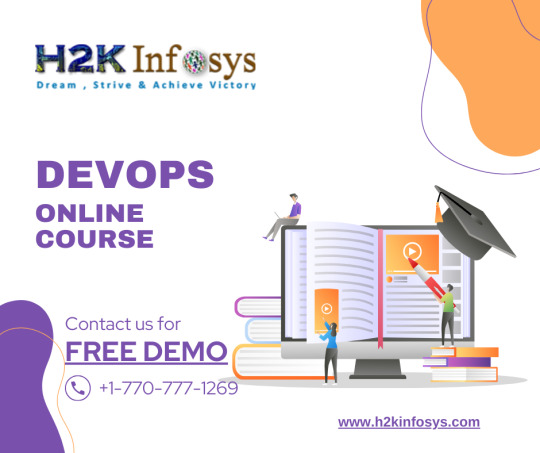
Hands-On Experience: DevOps is a practical discipline, and H2K Infosys understands the importance of hands-on experience. The program includes real-world projects and exercises to ensure that you can apply your knowledge in a practical setting.
Certification: Upon successful completion of the DevOps certification training program, you will receive a globally recognized certification that demonstrates your competence and commitment to DevOps best practices. This credential will boost your credibility in the job market and open doors to exciting career opportunities.
Job Placement Assistance: H2K Infosys goes the extra mile to support your career journey. They provide job placement assistance, helping you connect with potential employers and land your dream DevOps job.
Benefits of DevOps Certification: Earning a DevOps certification from H2K Infosys can offer numerous advantages, such as:
Career Advancement: DevOps professionals are highly sought after by organizations looking to streamline their development and deployment processes. With a DevOps certification, you'll be better positioned for career growth and advancement.
youtube
Increased Earning Potential: DevOps practitioners often enjoy competitive salaries. Certification can lead to higher-paying job opportunities, ensuring a strong return on your investment.
Versatility: DevOps skills are transferable across various industries, making you a versatile asset in the job market.
Contribution to Organizational Success: DevOps practices are crucial for enhancing software quality and deployment speed, which ultimately contributes to an organization's success. As a certified DevOps professional, you'll play a vital role in achieving these goals.
Job Satisfaction: Working in DevOps allows you to collaborate with cross-functional teams, automate repetitive tasks, and solve complex challenges. This can lead to higher job satisfaction and a sense of accomplishment.
Conclusion
DevOps is not just a trend; it's a fundamental shift in the way IT operations and software development coexist. Earning a DevOps certification from H2K Infosys can be your ticket to a promising and fulfilling career in this dynamic field. With a top-tier curriculum, expert instructors, hands-on experience, and job placement assistance, H2K Infosys ensures that you are well-prepared to excel as a DevOps professional. Don't miss the opportunity to join the ranks of elite DevOps practitioners—enroll in H2K Infosys' DevOps certification program today and take your career to the next level.
Tags: H2KInfosys, Devops certification H2K Infosys, Best DevOps in GA USA, worldwide top rating AWS DevOps Certification | H2K Infosys, devops certification, aws devops certification, azure devops certification, devops training,devops training near me, devops tutorial,devops certification training course
#awsdevopscertification #devopscertification #azuredevopscertification, #h2kinfosys,
#ClusterComputing, #RealTimeProcessing, #MachineLearning, #AI, #DataScience, #CloudComputing,#BigDataAnalytics, #DataEngineering
Contact: +1-770-777-1269
Mail: [email protected]
Location: Atlanta, GA - USA, 5450 McGinnis Village Place, # 103 Alpharetta, GA 30005, USA.
Facebook: https://www.facebook.com/H2KInfosysLLC
Instagram: https://www.instagram.com/h2kinfosysllc/
Youtube: https://www.youtube.com/watch?v=fgOgOCT_6L4
Visit: https://www.h2kinfosys.com/courses/devops-online-training-course/
DevOps Course: bit.ly/45vT1nB
#education#h2kinfosys#online training#online course#online courses#azure devop#azuredeveloper#azuredevops#microsoft azure#aws devops#aws#devops trends#devops#azure devops#Youtube
0 notes
Text
https://www.aimdek.com/top-7-devops-trends-to-digitally-transform-your-business-at-scale/#How_AIMDek_can_help_you_empower_businesses_with_DevOps_trends
Nowadays, every organization is considered a software organization. From startups and small businesses to large enterprises are stepping up the digital game with DevOps adoption. With the rise in cloud-native tools, the DevOps approach is increasingly becoming popular. However, it’s not essential that every company drive success by embracing DevOps because DevOps trends are changing at speed. Only those companies gaining an edge in the fierce competition have successfully implemented DevOps trends. The imperative to maximize business value and their efficiency, it is important to know and analyzing DevOps trends in 2023. For more information, contact our DevOps Experts.
0 notes
Link
0 notes
Text
Looking to boost your team's efficiency? Check out our list of the 15 best DevOps tools to pick for your teams in 2024. These tools are game-changers!
Which one are you most excited to try?
2 notes
·
View notes
Text
#devops#online#language#education#trendingnow#viralpost#technology industry#technology trends#developer#code
5 notes
·
View notes
Text




Don't miss out on the latest IT DevOps trends!
Learn about the top trends that are shaping the industry in the latter half of 2023.
2 notes
·
View notes
Text
AWS and Devops Training in Hyderabad
The Combination of Both Aws and Devops is Highly a Good Combination in the market it has been a highly demanded Designation in software industry so, most of companies are rapidly hiring Aws and Devops cloud engineers.
Why Learn AWS And Devops Together? Aws is the leading cloud platform, while Devops ensure efficent automation and CI/CD pipelines. High demand for Aws and devops in the Hyderabad and worldwide. ofeers higher salaries and career growth opportunities.

What you will learn in Awd and Devops in Training Period? Aws cloud Fundamentals-EC2,S3,IAM,VPC,RDS and more Services. Devops Tools- Git,Docker,Kubernetes,Jenkins,Terraform,Ansible. CI/CD pipelines & IAC. Hands-on Aws Devops Projects with real time experience. Caree opportunities with AWS and Devops roles Such as:
AWS Devops Engineer Cloud Engineer Devops Architect Automation Engineer Site Reliability Engineer
For these Hyderabad is a top Version IT destination offering Quality with: Experienced trainers with real-world AWS Devops expertise. Hands-on learning with live projects. Placement assistance and career guidance.
Start your career with an Advanced AWS and Devops Training in Hyderabad.at VersionIT institution to gain expertise to work in cloud automation and Devops-driven environment
#softwaredevelopment#devops#software#it services#viral trends#trending#market trends#viral#aws#awscloud#cloud computing
1 note
·
View note
Text
How Technology is Transforming the Global DevOps Market in 2028
Technology has been the driving force behind the transformation of the global DevOps market, which reached a valuation of $10 billion in 2023. The integration of cloud computing, artificial intelligence (AI), and automation tools is revolutionizing software development and IT operations, enabling organizations to enhance efficiency, reduce time-to-market, and improve scalability. This blog explores the technological advancements reshaping the DevOps industry, case studies of successful implementations, challenges in technology adoption, and the future outlook for the market.
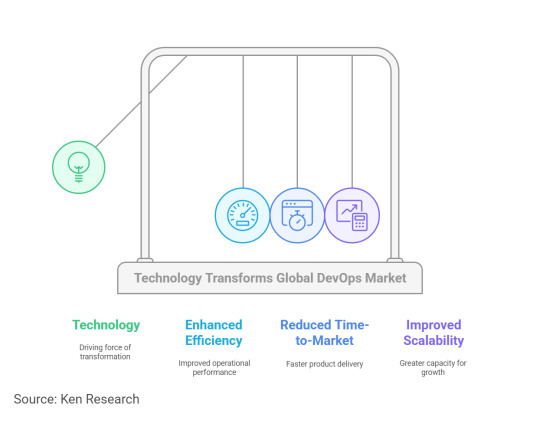
Download the Sample Report@ Global DevOps Market
Technological Advancements
1. Cloud Computing in DevOps
Application and Benefits: Cloud computing has become the backbone of modern DevOps practices, offering scalability, flexibility, and cost-efficiency. Cloud-based DevOps tools simplify collaboration among distributed teams and streamline deployment processes.
Impact: In 2023, the cloud segment dominated the DevOps market due to its ability to support hybrid IT environments, enabling seamless integration across on-premise and cloud infrastructures.
Example: Microsoft Azure DevOps provides cloud-based solutions that integrate CI/CD pipelines, enabling faster development cycles for businesses of all sizes.
2. Artificial Intelligence (AI) and Machine Learning in DevOps
Application and Benefits: AI and machine learning are enhancing automation within DevOps pipelines by enabling predictive analytics, anomaly detection, and intelligent decision-making.
Impact: AI integration allows teams to optimize resource allocation, detect potential failures, and resolve issues proactively, reducing downtime and improving reliability.
Example: IBM Corporation expanded its AI-driven automation capabilities in 2023, offering solutions that deliver real-time insights into DevOps workflows.
3. DevSecOps for Enhanced Security
Application and Benefits: DevSecOps integrates security practices into every stage of the software development lifecycle, ensuring compliance and reducing vulnerabilities.
Impact: In 2024, organizations increasingly adopted DevSecOps to address rising cyber threats, particularly in regulated industries like finance and healthcare.
Example: Google Cloud’s Assured Workloads for DevOps ensures adherence to compliance standards, offering secure DevOps pipelines for regulated sectors.
4. Microservices Architecture and Containerization
Application and Benefits: Microservices architecture, combined with containerization tools like Docker and Kubernetes, allows developers to create modular, scalable applications.
Impact: These technologies simplify the deployment and management of complex applications, enabling faster updates and enhanced scalability.
Example: Red Hat OpenShift’s enhanced support for containerized microservices in 2024 has streamlined operations for businesses adopting this architecture.
Case Studies
1. IBM Corporation: AI-Driven Automation
In 2023, IBM expanded its DevOps portfolio with AI-driven automation tools designed for hybrid cloud environments. These tools enabled enterprises to automate repetitive tasks, reduce operational bottlenecks, and enhance the efficiency of software deployment processes.
Results:
Reduced application downtime by 30%.
Improved time-to-market for new applications by 40%.
2. Google Cloud: Assured Workloads for DevOps
Google launched Assured Workloads for DevOps in 2024, targeting regulated industries like healthcare and finance. This solution allowed organizations to implement DevOps pipelines that adhered to strict compliance standards, ensuring data security and regulatory compliance.
Results:
Enhanced adoption of DevOps practices in compliance-heavy sectors.
Reduced security vulnerabilities in application deployment pipelines.
Challenges of Tech Integration
1. Security and Compliance Concerns
Challenge: The rise in cyberattacks has amplified concerns over the security of DevOps processes, especially in cloud environments. Ensuring compliance with regulatory standards is another significant challenge.
Recommendation: Adopt DevSecOps practices, implement robust encryption protocols, and provide training to DevOps teams on security best practices.
2. Skill Shortages
Challenge: The global shortage of skilled DevOps professionals, particularly in emerging markets, is slowing the adoption of advanced technologies.
Recommendation: Invest in upskilling programs, partner with educational institutions, and leverage automation to reduce dependency on human expertise.
3. High Costs of Technology Implementation
Challenge: Implementing cutting-edge DevOps technologies like AI and containerization requires significant upfront investment, which may deter small and medium enterprises (SMEs).
Recommendation: Opt for scalable, cloud-based DevOps solutions that align with budget constraints and provide long-term ROI.
Future Outlook
Integration with Edge Computing: By 2028, the integration of DevOps with edge computing environments will redefine how decentralized and distributed computing resources are managed. This trend, fueled by the deployment of 5G networks, will accelerate real-time application development in sectors like autonomous vehicles and smart cities.
Widespread Adoption of DevSecOps: The global emphasis on cybersecurity will drive the widespread adoption of DevSecOps as a standard practice. By 2028, the market for DevSecOps tools is expected to reach $20 billion, with significant adoption in finance, healthcare, and government sectors.
AI-Powered DevOps: AI and machine learning will continue to transform DevOps processes, enabling organizations to predict system failures, optimize workflows, and improve decision-making. This will further reduce operational costs and enhance application reliability.
Conclusion Technology is at the heart of the transformation in the global DevOps market. From cloud computing and AI integration to the adoption of DevSecOps and containerization, these advancements are reshaping software development and IT operations. While challenges like skill shortages and security concerns persist, organizations that embrace innovation and invest in scalable, secure solutions will be well-positioned to thrive in this dynamic market.
#Global DevOps Market#Global DevOps Industry#DevOps Market#DevOps Market Share#DevOps Market Trends#DevOps Market Forecast#DevOps Market Analysis#Globa DevOps Market Research Report
0 notes
Text
7 DevOps Trends that drive the Tech Sector in 2024

DevOps includes best practices that add quality to software releases and aid their development process. The focus is on automation of software development and enhanced collaboration between IT and software development. In this MarsDevs article, we will examine the top 7 DevOps trends that are driving the technological sector in 2024.
0 notes
Text

Today, companies are finding new ways to run their businesses so they can be competitive. This usually requires digital transformation, which is the process of applying technology in order to simplify operations, associate with customers, and most importantly, provide more value. Digital transformation is not only a trend; it is an unavoidable action for a company that wants to survive in the present-day air-conditioned market.
0 notes
Photo

(vía Project Management Trends, 2025, Tendencias)
0 notes
Text
The global DevOps market size reached USD 13.2 Billion in 2024. IMARC Group expects the market to reach USD 81.1 Billion by 2033, exhibiting a growth rate (CAGR) of 19.95% during 2025-2033. The shifting preferences from traditional data centres to hybrid systems, the increasing focus on automating business processes across various industries, and the rising demand for serverless computing represent some of the key factors driving the market growth.
0 notes
Text
Breaking into the Cloud Computing and DevOps Field: Where to Start?

The tech landscape is rapidly transforming, with cloud computing and DevOps at the forefront of this evolution. As businesses increasingly migrate their operations to the cloud and adopt agile practices, the demand for skilled professionals in these areas continues to rise. If you’re looking to break into this exciting field, one of the best first steps is to enroll in a cloud computing institute in Hyderabad. Here’s how to get started on your journey.
Understanding the Basics
Before diving into a career in cloud computing and DevOps, it’s essential to understand what these fields entail. Cloud computing involves delivering various services, such as storage, databases, and software, over the internet, enabling businesses to operate more efficiently. DevOps is a set of practices that integrates software development (Dev) and IT operations (Ops), fostering collaboration and streamlining workflows.
Understanding these concepts in cloud computing institute in Hyderabad lays the foundation for your career. Once you grasp the basics, you can focus on acquiring the necessary skills and knowledge.
Choosing the Right Cloud Computing Institute in Hyderabad
Selecting a reputable cloud computing institute in Hyderabad is crucial for your education and future career. Look for institutes that offer:
Comprehensive Curriculum: Ensure the program covers essential topics such as cloud service models (IaaS, PaaS, SaaS), deployment models, cloud security, and fundamental DevOps practices.
Hands-On Training: Practical experience is vital. Choose institutes that offer labs, projects, and internships to apply theoretical knowledge in real-world scenarios.
Industry Recognition: Look for programs that are well-regarded in the industry, ideally with partnerships or collaborations with leading tech companies.
Experienced Instructors: Learn from professionals with real-world experience who can provide valuable insights and mentorship.
Certifications: Opt for institutes that prepare you for industry-recognized certifications, such as AWS Certified Solutions Architect or Microsoft Certified: Azure Fundamentals. These credentials enhance your employability and credibility.
Building Your Skill Set
Once you’ve enrolled in a cloud computing institute in Hyderabad, focus on building your skill set. Key areas to concentrate on include:
Cloud Platforms: Familiarize yourself with major cloud service providers like AWS, Microsoft Azure, and Google Cloud. Understanding their services and offerings will give you a competitive edge.
Networking and Security: Learn about network configurations, security protocols, and compliance standards relevant to cloud environments.
DevOps Tools: Gain proficiency in popular DevOps tools such as Docker, Kubernetes, Jenkins, and Git. These tools are essential for automating processes and enhancing collaboration.
Scripting and Automation: Basic programming and scripting skills (Python, Bash, etc.) can significantly enhance your ability to automate tasks and manage cloud resources efficiently.
Gaining Practical Experience
Practical experience is crucial for solidifying your understanding and enhancing your resume. Participate in internships or collaborative projects during your training. Many cloud computing institutes in Hyderabad offer internship placements that can provide invaluable experience.
Additionally, consider contributing to open-source projects or creating your own projects. This hands-on experience not only helps you apply your skills but also demonstrates your initiative and problem-solving capabilities to potential employers.
Networking and Building Connections
Networking is essential in the tech industry. Attend workshops, webinars, and local meetups to connect with professionals and peers. Joining online forums and social media groups focused on cloud computing and DevOps can also help you stay updated on industry trends and job opportunities.
Leverage platforms like LinkedIn to showcase your skills, share your projects, and engage with industry leaders. Building a strong professional network can lead to mentorship opportunities and job referrals.
Exploring Career Opportunities
Once you’ve completed your training from cloud computing institute in Hyderabad and gained practical experience, it’s time to explore career opportunities. The job market for cloud computing and DevOps professionals is robust, with various roles available, including:
Cloud Engineer: Responsible for managing and implementing cloud services and solutions.
DevOps Engineer: Focuses on integrating development and operations to improve deployment efficiency and reliability.
Cloud Architect: Designs and oversees cloud infrastructure and strategy.
Site Reliability Engineer (SRE): Ensures systems' reliability and performance through proactive monitoring and incident management.
Many organizations are actively seeking talent in these roles, offering competitive salaries and benefits.
Continuous Learning and Development
The tech landscape is ever-evolving, making continuous learning vital. After starting your career, consider pursuing additional certifications or advanced training programs to keep your skills updated. This commitment to learning will enhance your career trajectory and keep you relevant in a competitive job market.
Conclusion
Breaking into the cloud computing and DevOps field may seem daunting, but with the right approach, it can be an exciting and rewarding journey. Start by enrolling in a reputable cloud computing institute in Hyderabad to gain the foundational knowledge and skills necessary for success. Focus on building your expertise, gaining practical experience, and networking within the industry. By taking these steps, you’ll be well on your way to establishing a fulfilling career in these dynamic and in-demand fields. Embrace the challenge, and you’ll find a world of opportunities waiting for you!
#technology#ai#devops#aws#Cloud Computing#cloud computing course in mumbai#cloud computing trends#cloud computing certification#cloud computing market#cloud computing training#cloud computing jobs#cloud computing course#DevOps#aws devops course in hyderabad#devops certification#DevOps training#DevOps course#DevOps training in hyderabad#aws training in hyderabad#aws cloud#aws certification#aws course
0 notes
Text

Unlock the power of DevOps to transform your SaaS product development. Discover the key benefits in our latest blog.
0 notes